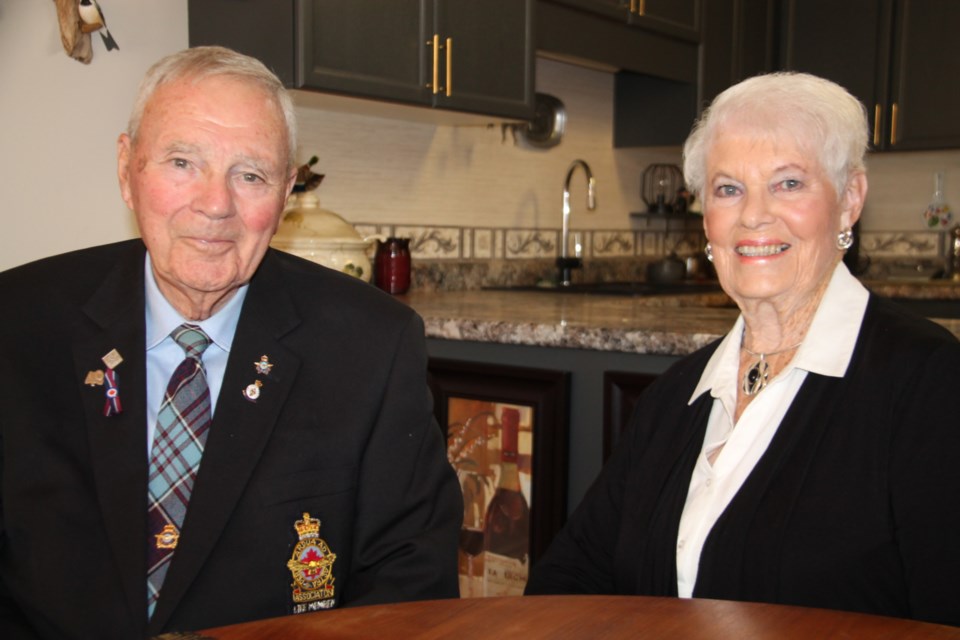While looking back on some of the stories I wrote for SooToday in 2020, there is one which especially comes to mind after I viewed The Battle of Britain war movie while channel surfing over the weekend of Nov. 28.
In September, I enjoyed speaking with the Sault’s Alan and Hilda Fell as they shared their own real life stories from that battle.
Alan and Hilda were children living in London, England during the Second World War, survivors of Nazi Germany’s bombing of the UK capitol and many other British cities during the period known as ‘the Blitz.’
The couple emigrated to Canada from their native England in 1956, lived and worked in Ottawa, then BC, before moving to Sault Ste. Marie to be closer to family in their retirement years in 1998.
Listening to Alan and Hilda’s recollections of the Blitz during the 1940 Battle of Britain, when Britain stood alone against the Nazi onslaught, resonated with me, as it reminded me of stories my own English parents told me of that period, as they also survived that intense chapter in the country’s history.
“The local council installed an air raid shelter in our backyard, in which we spent many nights during the Blitz,” Alan recalled.
“When the raids started, we would dash for the shelter and come out for the all clear.”
Unlike the Fells in London, located in England’s southeast, my parents were born and raised in Sunderland, a city on the northeastern coast of England, but being a shipbuilding centre, that city was also a target for Hitler’s Luftwaffe.
I remember my father telling me of the spine chilling sound of the air raid sirens going off in Sunderland, warning of an imminent Nazi raid on the city, his family taking cover.
Fortunately, no one in my father’s or mother’s families were killed or injured in the raids.
However, I do remember my father telling me that my grandfather was a member of the crews who searched through the rubble of homes and businesses looking for the bodies of those killed during air raids or pulling survivors from the debris.
My grandfather told him “it was bad enough finding grownups, but worse finding children.”
Hilda Fell, like many other children in British cities targeted by Nazi bombing, was sent to a safe setting through a British government program which evacuated urban children to homes owned by rural host families while the bombing raged on in the cities.
Likewise, my mother and aunt were sent to a quiet rural setting in Yorkshire.
It was terrifying to be separated from one’s family and sent away on a train to the next county, not knowing what kind of host family you would be living with.
Thankfully, my mother and aunt enjoyed their host homes.
“One day (after returning from a year long evacuation) I was lining up at the grocery store and an enemy bomber came over, and it was so low I could even see the pilot as it flew over the road,” Hilda Fell recalled as we spoke in September.
“I was aghast.”
Her husband Alan said it was later discovered that specific enemy bomber was shot down by two RAF Hurricane fighter planes, the bomber crashing near a sewage plant, its crew killed in the crash.
When Alan said the plane was a Heinkel He 111, I knew exactly what he was talking about (I being a Second World War history buff).
Many surviving German Heinkel He 111 bombers were used in the making of The Battle of Britain film.
Watching the film again (I've seen it many times), naturally, reminded me of my recent chat with Alan and Hilda.
Alan worked as a skilled tradesperson, trained in interior painting and decorating, having also served for two years in Britain’s Royal Air Force (RAF) in the early 1950s (serving in the military was still a compulsory matter in Britain from 1947 to 1963, known as ‘National Service’).
Those were facts I pulled from my conversation with the Fells, sentimental points for me as my father too was skilled in the same trade and also served with the RAF for a compulsory two years in the early 1950s.
Who knows, my father (who served with the RAF in southern England, far from his hometown in the northeast) and Alan (the two men born a year apart) may have even been stationed at the same base and crossed paths many times without actually being formally introduced.
Alan and Hilda Fell reminded me in many ways of my own parents.
They lived through the same Blitz, saw their homeland survive and fight on to victory, settled in the same Canadian city, all with that ‘lady and gentleman’ dignity you find so often in that fine generation.
I enjoyed meeting the Fells and gained an even deeper admiration for my mother and father.
It isn’t often a story affects you that way, and this is one I’ll remember as I look back on 2020.
